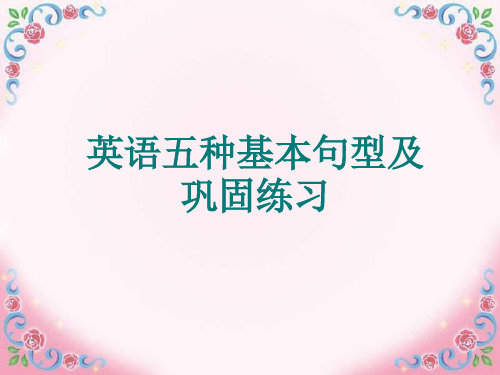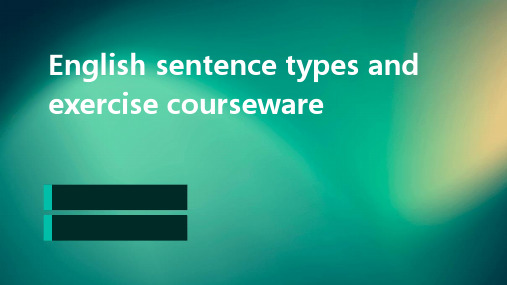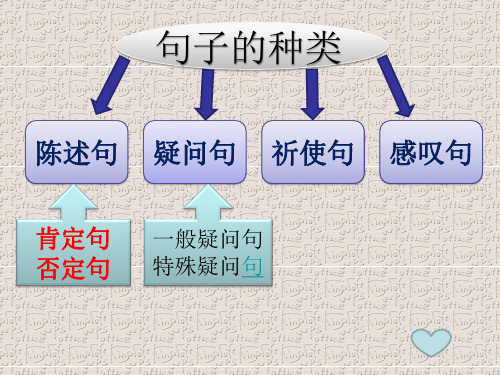完整版英语句子的种类及练习课件
合集下载
句子的种类(50张PPT)初中英语专项复习课件

2.一般疑问句的回答 一般疑问句的肯定回答通常用“Yes,主语+be动词/情态动词/助动词”; 否定回答通常用“No,主语+be动词/情态动词/助动词+not”。not 习 惯上与前面的be动词、情态动词或助动词构成缩写词,但是be动词am 除 外。
三、选择疑问句 1.选择疑问句的回答 选择疑问句一般不用yes或no回答,而是选择一种情况回答。如: —Which one do you prefer,the red one or the blue one? 你更喜欢哪一件,红色的还是蓝色的? —I prefer the red one.我更喜欢红色的。
3.表示部分否定的词,如not all,not everything,not everybody,not everywhere,not always等。如: Not all students go to school by bike.不是所有的学生都骑自行车上 学。 4.宾语从句的否定形式:当主语为第一人称,谓语为 think,believe,suppose等词时,形式上否定主句实则否定宾语从句。如: I don’t think he’ll come. 我认为他不会来。
答案 A
解析 考查动词时态,本句为陈述句。句意:自从我来到长沙我们就没见过
面,但我们经常发邮件。根据since I came to Changsha可知,句子时态
为现在完成时,其构成为:have/has+动词过去分词,故选A项。
考点清单
分类
意义
肯定句
表示肯定的陈述
否定句
表示否定的陈述
例句
I get up at 6 o’clock every morning. 我每天早上六点起床。
句子的种类(陈述句、疑问句、祈使句、感叹句、倒装句)初中英语专项复习课件(18张PPT)

ห้องสมุดไป่ตู้
—________.
A.So do I
B.So am I
C.Neither am I D.Neither do I
( )5. —________ can we find your brother at weekends?
—On the football field.
A.When
B.Which
C.Why
(2)What+形容词+复数可数名词/不可数名词(+主语+谓 语)!如:What useful information!
2.how引导的感叹句。 (1)How+形容词/副词+主语+谓语!如: How kind they are! (2)How+陈述句(主语+谓语)!如: How time flies! 3.what引导的感叹句可以和how引导的感叹句互换。如: What a good girl! = How good the girl is!
She seldom goes swimming, does she?
(4)陈述部分的主语为指物的不定代词时,问句部分的主语 用it。如:
Something is wrong with the computer, isn't it?
(5)陈述部分的主语为指人的不定代词时,问句部分的主语 用he或 they,这时问句动词的数应和he或 they一致。如:
1.一般疑问句:通常用来询问一件事情是否属实。答句 通常是“Yes”或“No”。如:
—Are you tired? —Yes, I am.“你累吗?”“是的,我累。”
2.选择疑问句:指提出两个或两个以上可能的答案供对 方选择。如:
Shall we go home or stay here for the night? 我们回家还是 待在这里过夜?
—________.
A.So do I
B.So am I
C.Neither am I D.Neither do I
( )5. —________ can we find your brother at weekends?
—On the football field.
A.When
B.Which
C.Why
(2)What+形容词+复数可数名词/不可数名词(+主语+谓 语)!如:What useful information!
2.how引导的感叹句。 (1)How+形容词/副词+主语+谓语!如: How kind they are! (2)How+陈述句(主语+谓语)!如: How time flies! 3.what引导的感叹句可以和how引导的感叹句互换。如: What a good girl! = How good the girl is!
She seldom goes swimming, does she?
(4)陈述部分的主语为指物的不定代词时,问句部分的主语 用it。如:
Something is wrong with the computer, isn't it?
(5)陈述部分的主语为指人的不定代词时,问句部分的主语 用he或 they,这时问句动词的数应和he或 they一致。如:
1.一般疑问句:通常用来询问一件事情是否属实。答句 通常是“Yes”或“No”。如:
—Are you tired? —Yes, I am.“你累吗?”“是的,我累。”
2.选择疑问句:指提出两个或两个以上可能的答案供对 方选择。如:
Shall we go home or stay here for the night? 我们回家还是 待在这里过夜?
句子的种类(22张PPT)初中英语专项复习课件

English is the easiest subject to learn
5.is, a, what, useful, it, subject__________________________!
What a useful subject it is
6.you, her, do, remember______________________?
考点3 祈使句
祈使句表示命令、请求、建议或劝告等。其主语通常被省略,谓语动词用原形,句末用句号或感叹号。
肯定祈使句
1.(Please)+动词原形+其他Listen to English songs when you are free.
2.Let+第一、三人称的宾格/名词+动词原形+其他Let the students come in!
What present did you buy
15.out, who, find, help, needs_________________________.
Find out who needs help
感谢您的观看
Do you remember her
7.it, when, you, did, take______________________?
When did you take it
8.beautiful, look, the, at, flowers____________________________.
What引导的感叹句
1.What + a/an + 形容词 + 可数名词单数形式(+ 主语 + 谓语)!●What a beautiful skirt!●What an exciting speech our headmaster gave just now![2022滨州中考]
5.is, a, what, useful, it, subject__________________________!
What a useful subject it is
6.you, her, do, remember______________________?
考点3 祈使句
祈使句表示命令、请求、建议或劝告等。其主语通常被省略,谓语动词用原形,句末用句号或感叹号。
肯定祈使句
1.(Please)+动词原形+其他Listen to English songs when you are free.
2.Let+第一、三人称的宾格/名词+动词原形+其他Let the students come in!
What present did you buy
15.out, who, find, help, needs_________________________.
Find out who needs help
感谢您的观看
Do you remember her
7.it, when, you, did, take______________________?
When did you take it
8.beautiful, look, the, at, flowers____________________________.
What引导的感叹句
1.What + a/an + 形容词 + 可数名词单数形式(+ 主语 + 谓语)!●What a beautiful skirt!●What an exciting speech our headmaster gave just now![2022滨州中考]
句子的种类(20张PPT)初中英语专项复习课件

他?
(2)特殊疑问句
用特殊疑问词(组)引导的疑问句叫作特殊疑问句,回答时不能使用yes或no,
而是根据实际情况作答。
疑问词(组)
含义及用法
例句
who which what
“谁”,询问身份
“哪一个”,询问特定的人或 物 “什么”,询问职业或身份等
Who is the man under the tree? 树底下的那个男人是谁? Which book do you like?你喜欢 哪一本书? —What is he?他是干什么的? —He's a teacher.他是一名教师。
句子的种类
初中英语专项复习
1.陈述句
构成
谓语动词不含否定词。分为两 肯定 形式 种,一种为正常语序,一种为倒
装语序
例句 ①My parents are both doctors. 我的父 母都是医生。 ②In the center of the city is a big park.这个城市中心有一个大公园。
Tom doesn't like playing the piano. 汤 姆不喜欢弹钢琴。
构成 除not外,使用其他否定词也可构 成否定句,如no,never, 否定 形式 seldom,hardly,nothing, neither,nobody,few,little, nhave never been to Shanghai. 我从 来没有去过上海。 ②None of these pens works/work. 这 些钢笔没有一支能用。
11.(2023吉林改编)—__H_o_w__f_a_r_ is it from our school to the new bookstore, Li Lei? —Only one kilometer. 12.(2023营口改编)—Lingling, _h_o_w___s_o_o_n_ will your brother come back from abroad? —Hmm, in a week. 13.(2023宿迁改编)—China won all the gold medals at the 2023 World Table Tennis Championships. —_W__h_a_t_exciting news!
初中英语《五种基本句型及练习》课件

3.表示状态变化的 become, get, turn, go, fall, grow
Examples: The cake tastes delicious. The potatoes went bad in the fields.
Deep water stays still. (静水必深)
翻译练习:(主系表结构) 1.今天天晴。
1. I have an apple. 2.Tom made a hole in the wall. 3. I don't know him. 4. Mother promises to give me a present.
翻译练习:(主谓宾结构)
I1w.r昨o晚te我写a了le一t封te信r。last night. H2e.这h本as书他re读a过d多t次h了is。book many times. 3T.h他e们y完h成a了ve计划c。arried out the plan.
3、复合句有两套主谓结构,含有一个主句和一个或一个
以上的从句。如:If we want to keep fit , we must do more exercise. The man who is selling vegetables is our neighber.
二、简单句的五种基本句型:
1、主语+连系动词+表语
5.树叶已经变黄了。
The leaves have turned yellow. 6.这个报告听起来很有意思。
The report sounds interesting.
英语基本句型-2主谓结构
本结构是由“主语+不及物动词”构成, 常用 来表示主语的动作行为。 如:The sun rises. Tom has already left.
Examples: The cake tastes delicious. The potatoes went bad in the fields.
Deep water stays still. (静水必深)
翻译练习:(主系表结构) 1.今天天晴。
1. I have an apple. 2.Tom made a hole in the wall. 3. I don't know him. 4. Mother promises to give me a present.
翻译练习:(主谓宾结构)
I1w.r昨o晚te我写a了le一t封te信r。last night. H2e.这h本as书他re读a过d多t次h了is。book many times. 3T.h他e们y完h成a了ve计划c。arried out the plan.
3、复合句有两套主谓结构,含有一个主句和一个或一个
以上的从句。如:If we want to keep fit , we must do more exercise. The man who is selling vegetables is our neighber.
二、简单句的五种基本句型:
1、主语+连系动词+表语
5.树叶已经变黄了。
The leaves have turned yellow. 6.这个报告听起来很有意思。
The report sounds interesting.
英语基本句型-2主谓结构
本结构是由“主语+不及物动词”构成, 常用 来表示主语的动作行为。 如:The sun rises. Tom has already left.
句子成分和句子结构(31张PPT)初中英语专项复习课件

AB C
D
③ She find it difficult to do the work.
ABC
D
④ They call me Lily sometimes.
AB C
D
⑤ I saw Mr. Wang get on the bus.
主 表 宾 定 状 宾补
1) 主语(subject) 句子的主体,全句述说的对象。一般由担任,常置于句首。
名词,主格代词 ,动词不定式,动名词或从句
I like football. The boy needs a pen. 2) 谓语(predicate) 说明主语的动作或状态。由 动词 担任。常置于主语后。 The train leaves at 6 o’clock. I want a ticket.
I am very sorry. We often help him. When I grow up , I am going to be a teacher . (从句作时间状语)
八大句子成分
主语 谓语 宾语 宾语补足语 表语 定语 状语 同位语
十大词类
冠词 名词 代词 数词 形容词 副词 介词短语 动名词 动词不定式 分词
5) 宾补(objective complement) 补充说明宾语的情况 。 由n. /adj. /介宾 /分词 /不定式等担任。 They made him‹king.› I consider the book‹too expensive.›
6) 定语(attributive) 对名词或代词起修饰、限定作用的词、短语或句子, 汉语中常用‘……的’表示,通常位于被修饰的成分前。
这间屋子里的男孩子们是10班的。 The students in the room are in Class Nine.
英语句子种类及练习课件PPT课件

Summary Exercise 1 Exercise 2 Exercise 3
This exercise explores the most complex presence structure, which includes both direct and direct objects
Label the subject, predict, direct object, and direct object in each sentence
Summary
This exercise introduces the addition of an object to the subject predicate structure
Exercise 1
Identify the subject, predict, and object in each sentence
Summary
This exercise introduces the addition of an object to the subject predicate structure
Exercise 1
Identify the subject, predict, and object in each sentence
01
Summary
This exercise focuses on creating simple sentences with
a subject and predicate
03
Exercise 2
Fill in the blanks with the appropriate subject and predict to complete the
七年级英语句子的分类(完整版).ppt

根据答语写问句(有的答案可以多样)
1. Yes, I like music very much. 2. No, it isn't. Music is my favorite. 3. My favorite color is green. 4. Because it's fun. 5. My birthday is on February 5th. 6.
2. Tom likes peaches. Does Tom like peaches?
一般疑问句的肯定回答、 否定回答。
Yes,… 代词主格+关键词。
No,…代词主格+关键词 +not.
1.Is she a pupil? Yes, she is.
No, she is not./No, she isn`t. 2.Can you see a star?
据实回答
1. Does your father eat fruit after dinner? 2. Is your birthday before(在...前) July? 3.Where is your math book? 4. What color do you like? 5. Do you have art on Wednesday? 6. Why do you like computer? 7. How much is your pen? 8. What's your favorite day? 9. Who is your history teacher? 10. When is your mother's birthday?
Yes, I can.
No, I can not./No, I can`t.
- 1、下载文档前请自行甄别文档内容的完整性,平台不提供额外的编辑、内容补充、找答案等附加服务。
- 2、"仅部分预览"的文档,不可在线预览部分如存在完整性等问题,可反馈申请退款(可完整预览的文档不适用该条件!)。
- 3、如文档侵犯您的权益,请联系客服反馈,我们会尽快为您处理(人工客服工作时间:9:00-18:30)。
? Is he six or seven years old? ? Mary can swim, can 't she?
? 3 、祈使句:
? Be careful, boys;
? Don't talk in class
? 4 、感叹句: How clever the boy is!
1、陈述句 说明一个事实或陈述一个看法,有肯 定式和否定式,语序是主语在前,谓语在后。
B、复杂特殊疑问句
What do you think he has done?
3)选择疑问句
? 选择疑问句(alternative questions) ? 一般提出两种或两种以上的可能,问对方选择哪
一种。 ? 其结构可用一般疑问句,也可用特殊疑问句,供
选择的两部分由or连接,前者用升调,后者用降 调,如:
英语句子的种类
? 一、句子种类两种分类法 ? ( 一 )、按句子的用途可分四种: ? 1 、陈述句(肯定、否定):
? He is six years old; ? She didn't hear of you before.
? 2 、疑问句(一般、特殊、选择、反意):
? Do they like skating? ? How old is he?
短的疑问句,对陈述句提出相反 的疑问,这种疑问句叫反意疑问 句。 如:
1. He is clever, isn't he? 2. We speak Chinese, don't we?
B、结构:
结构一: 前肯,+ 后否 eg. He is clever, isn't he?
结构二: 前否,+ 后肯 eg. He isn't clever, is he?
结构一: 前肯,+ 后否
Be 动词:
1. You are an actor, __a__re_n__'t_ __y_o_u_ ? 2. He is a good boy, ___i_s_n_'_t _ ___h_e__ ? 3. It was fine yesterday, _w__a_s_n_'_t _i_t_ ? 4. You were studying when I called
? Will you go there by bus or by train?
? What would you like,coffee or tea?
(1)以一般疑问句为基础 Is he a teacher or a doctor or a policeman?
Shall I help you or can you manage? (2)以特殊疑问句为基础
---Haven't you been to the UK?
---No, I haven 't.
2)特殊疑问句
1.特殊疑问句的定义; 以特殊疑问词开头,对句中某一成分提问的 句子叫特殊疑问句。
常用的疑问词有: what who whom whose which when where how why等。
Which do you prefer, red wine or white? How shall we go there? By bus or by train? (3) or not构成的选择疑问句
Do you want to buy it or not?
4): 反意疑问句
A、含义: 在一个陈述句之后附上一个简
She arrived early. She can not have arrived now. 注:1)半否定句
I hardly know anything about it.
2)部分否定句与全否定句 I don't like both the films. I like neither Cathy nor Mary.
其它动词:
1. You will go to America, _w__o_n_'_t _y_o_u? 2. We have ever been to Shanghai,
__h_a_v_e__n_'t_ __w_e___ ?
C、特殊用法(一)
1. His mother is a doctor, __is__n_'t_ _s_h_e_ ? 2. The dogs are fighting, _a__re_n__'t_ _t_h_e_y_? 3. There is a boy in our classroom,
2.特殊疑问句有两种语序 (1)陈述语序 Who was the first man in space? (2)倒装语序 Whom are you talking about?
注:A、简略式 Why not go alone? Why get so angry? How/What about taking a rest?
3)否定转移 I don't think it will be very cold today. (believe, expect, suppose, imagine)
2、疑问句
? (1)疑问句的主要交际功能是提出问题,询问 情况。
(2)、疑问句 的分类
? 分为一般疑问句、选择疑问句、特殊疑问句和反 意疑问句。
1)一般疑问句 用来询问一件事,答案通常是 yes或 no,注意语序。
Have you anythingto say? Did someonephone me last night? 否定疑问句 Can't you understand it? Isn't it a beautiful lake?
you last night, ___w_e__re_n__'t_ _y_o_u__ ? 5. She is going to visit me, _i_s_n_'_t _s_h_e_? 6. I am Chinese, _a_r_e_n_'_t __I____?
行为动词:
1. It often rains here, _d__o_e_s_n_'_t _i_t_ ? 2. He likes soccer, __d_o__e_s_n_'_t _h__e_ ? 3. You have a headache, __d_o_n_'_t_ _y_o_u? 4. I called you yesterday, _d__id_n__'t_ __I ?
? 3 、祈使句:
? Be careful, boys;
? Don't talk in class
? 4 、感叹句: How clever the boy is!
1、陈述句 说明一个事实或陈述一个看法,有肯 定式和否定式,语序是主语在前,谓语在后。
B、复杂特殊疑问句
What do you think he has done?
3)选择疑问句
? 选择疑问句(alternative questions) ? 一般提出两种或两种以上的可能,问对方选择哪
一种。 ? 其结构可用一般疑问句,也可用特殊疑问句,供
选择的两部分由or连接,前者用升调,后者用降 调,如:
英语句子的种类
? 一、句子种类两种分类法 ? ( 一 )、按句子的用途可分四种: ? 1 、陈述句(肯定、否定):
? He is six years old; ? She didn't hear of you before.
? 2 、疑问句(一般、特殊、选择、反意):
? Do they like skating? ? How old is he?
短的疑问句,对陈述句提出相反 的疑问,这种疑问句叫反意疑问 句。 如:
1. He is clever, isn't he? 2. We speak Chinese, don't we?
B、结构:
结构一: 前肯,+ 后否 eg. He is clever, isn't he?
结构二: 前否,+ 后肯 eg. He isn't clever, is he?
结构一: 前肯,+ 后否
Be 动词:
1. You are an actor, __a__re_n__'t_ __y_o_u_ ? 2. He is a good boy, ___i_s_n_'_t _ ___h_e__ ? 3. It was fine yesterday, _w__a_s_n_'_t _i_t_ ? 4. You were studying when I called
? Will you go there by bus or by train?
? What would you like,coffee or tea?
(1)以一般疑问句为基础 Is he a teacher or a doctor or a policeman?
Shall I help you or can you manage? (2)以特殊疑问句为基础
---Haven't you been to the UK?
---No, I haven 't.
2)特殊疑问句
1.特殊疑问句的定义; 以特殊疑问词开头,对句中某一成分提问的 句子叫特殊疑问句。
常用的疑问词有: what who whom whose which when where how why等。
Which do you prefer, red wine or white? How shall we go there? By bus or by train? (3) or not构成的选择疑问句
Do you want to buy it or not?
4): 反意疑问句
A、含义: 在一个陈述句之后附上一个简
She arrived early. She can not have arrived now. 注:1)半否定句
I hardly know anything about it.
2)部分否定句与全否定句 I don't like both the films. I like neither Cathy nor Mary.
其它动词:
1. You will go to America, _w__o_n_'_t _y_o_u? 2. We have ever been to Shanghai,
__h_a_v_e__n_'t_ __w_e___ ?
C、特殊用法(一)
1. His mother is a doctor, __is__n_'t_ _s_h_e_ ? 2. The dogs are fighting, _a__re_n__'t_ _t_h_e_y_? 3. There is a boy in our classroom,
2.特殊疑问句有两种语序 (1)陈述语序 Who was the first man in space? (2)倒装语序 Whom are you talking about?
注:A、简略式 Why not go alone? Why get so angry? How/What about taking a rest?
3)否定转移 I don't think it will be very cold today. (believe, expect, suppose, imagine)
2、疑问句
? (1)疑问句的主要交际功能是提出问题,询问 情况。
(2)、疑问句 的分类
? 分为一般疑问句、选择疑问句、特殊疑问句和反 意疑问句。
1)一般疑问句 用来询问一件事,答案通常是 yes或 no,注意语序。
Have you anythingto say? Did someonephone me last night? 否定疑问句 Can't you understand it? Isn't it a beautiful lake?
you last night, ___w_e__re_n__'t_ _y_o_u__ ? 5. She is going to visit me, _i_s_n_'_t _s_h_e_? 6. I am Chinese, _a_r_e_n_'_t __I____?
行为动词:
1. It often rains here, _d__o_e_s_n_'_t _i_t_ ? 2. He likes soccer, __d_o__e_s_n_'_t _h__e_ ? 3. You have a headache, __d_o_n_'_t_ _y_o_u? 4. I called you yesterday, _d__id_n__'t_ __I ?
